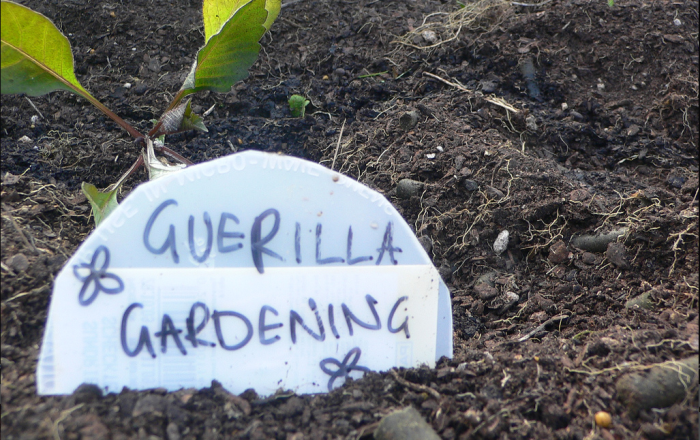A Green Path Out of the Crisis

Prices are rising, politics are instable, poorness is spreading across all layers of society. Greeks have been hit hard by the countries’ economic crisis during the last years. Parts of the civil society react to the status quo with a movement of community building and neighborhood projects. Some travel the country in a caravan and encourage their fellow countrymen to tell their stories. Others started gardening.
The way politicians dealt with the crisis disgruntled many environmentally conscious Greeks: Illegally constructed buildings outside of city planning areas were simply legalized, public land has been sold and a „fast-track“ law reduced public’s rights to object to project permissions given to private investors. Liquidity is Greece’s main political objective these days, whereas issues like environmental sustainability get subordinated.
An answer to the disappearance of this issue is growing in small structures. New projects of urban gardening emerged across the country already after the devastating wood fires in 2007. By now the initiatives are covering multiple dimensions of the experience of crisis: They raise ecological awareness, which is about to get overlain by capitalistic motives. They take place on public places, which are in this way re-claimed as their property by the civil society actors. They create spaces of backpedaling, questionning the quality of supermarket foods and their distribution. And the urban gardens make neighbors meet on beds with soiled hands, exchange ideas and let them grow something more together than tomatoes – a new sense of community.
[widgetkit id=19341]
In most of the initiatives gardening is tied to other community building activities – workshops, seminars, theatral trainings, debates. The majority of the primary planting collectives consisted of middle class, well educated and leftist activists, who politically came to the fore with the „real democracy“ movement in 2011. Due to this degrowth, self-management, independence and decentralization remain important key words of the movement. But meanwhile the urban ariculturists in Greece spread from an ecological and anarchist avant-garde to larger populations and neighborhoods. Numerous citizens who lost their jobs during the crisis are spending their time gardening – in order to fill their days with a useful, in the truest sense of the word fruitful activity.
One of the longest lasting projects in Greece is PERKA Thessaloniki (short for Periastiki Kalliergeia, “outskirts gardens”). On the grounds of a former military camp volunteers established a non-profit farm: „It covers part of the members’ needs, it supports vulnerable social groups and is based on the principles of organic, biodynamic or natural farming, using heirloom seeds and plants, while at the same time we enjoy the benefits of working with and being in contact with the earth“.
Participants of the nowadays already four existing PERKA groups, which are cultivating the spot, aim on reconnecting urban population with landscape life and intend to preserve their grounds from privatization. Their actions are open to anyone and already met much approval in the municipality. Both, regular and first time visitors can learn how to handle nature here and enjoy working together. And the plot is benefitting as well: Since the activists’ daily appearance the number of robberies, ransacking of the buildings and tree cutting decreased notably. In projects like PERKA Greeks get the opportunity to close ranks and bond again – to eachother, to nature, to their country.

